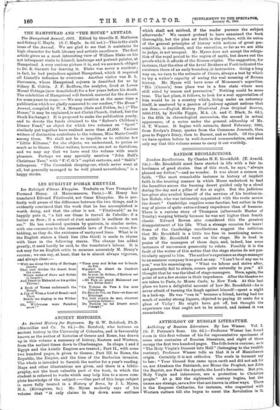ANCIENT HISTORIES.
An Ar.zient History for Beginners. By G. W. Botsford, Ph.D. (Macmillan and Co. 7s. 6d.)—Dr. Botsford, who lectures on ancient history in the University of Columbia, and is favourably known as the author of histories of Greece and Rome, has drawn up in this volume a summary of history, Eastern and Western, from the earliest times down to Charlemagne. In chaps. 1 and 2 Egypt and the Asiatic Empires are treated ; Part H., with some two hundred pages, is given to Greece; Part III. to Rome, the Republic, the Empire, and the time of the Barbarian invasion. The whole is intended to furnish the matter for a year's reading. Maps and other illustrations are given, and there is a biblio- graphy, not the least valuable part of the book, in which the student is referred to works which may help him to a more com- plete knowledge of the subject.—One part of this large subject is more fully treated in a History of Rome, by J. L. Myres, M.A. (Rivingtons, 5s.) Mr. Myres modestly says of his volume that "it only claims to lay down some outlines which shall not mislead, if the reader pursues the subject afterwards." We cannot pretend to have examined the book thoroughly, but the plan set forth in the preface, with its union of the general principles of history with notices of great per- sonalities, is excellent, and the execution, so far as we are able to judge, is not unequal. Mr. Myres does not accept the relega- tion of the regal period to the region of myth, but draws out the proofs which it affords of the Roman origins. The suggestion, for instance, that the rites of the Arval Brothers at Forti indicated the existence there of an early boundary, is instructive. Going a long way on, we turn to the estimate of Cicero, always a test by which to try a writer's capacity of seeing the real meaning of Roman history. Mr. Myres will have none of Mommsen's asperities. "His [Cicero's] true place was in a free state where men still ruled by reason and persuasion." Nothing could be more true. The last place, it follows, to look for a real appreciation of him would be in a country which, living under an autocracy itself, is mastered by a passion of jealousy against nations that are free.—English History Illustrated from Original Sources, 1660-1715, by Neville Figgis, MA. (A. and C. Black, 2s. 6d.), is the fifth in chronological succession, the second in actual appearance, of a series under the general editorship of Mr. G. T. Warner. It begins with extracts, dated February, 1660, from Evelyn's Diary, quotes from the Commons Journals, then goes to Pepys's Diary, then to Burnet, and so forth. Of the plan we have spoken before in well-deserved commendation, and need only say that this volume seems to carry it out worthily.






















































 Previous page
Previous page